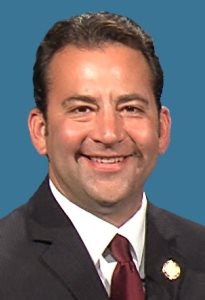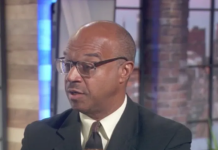Democratic Gov. Laura Kelly introduced a new budget Wednesday that revives ideas that have already proven unpopular with a Republican Legislature.
Kelly’s budget director, Adam Proffitt, unveiled a $20.9 billion budget for 2022 that calls for a tax on digital media products, restructuring payments to the state’s retirement system and expanding Medicaid.
The governor has pushed for those measures earlier, and all three have met resistance in the Legislature previously and would likely face similar opposition this year from a more conservative-leaning statehouse.
“Nothing was too surprising this morning,” said Republican state Rep. Troy Waymaster, chairman of the House Appropriations Committee.

“It’s very similar to the budget that we’ve heard in the past,” he said. “It just seems like we keep going back to the same methods…that have been rejected before by the Legislature.
“Why are we trying to resurrect the components of a budget that for the most part is not going to pass the Legislature?” he asked.
The governor’s spending plan, which calls for a 2.5% pay raise for state employees, depends on freeing up money by lowering and stretching out payments into the state employee pension fund.
The governor’s plan calls for extending the payment schedule for the Kansas Public Employees Retirement system by 10 years.
It would unlock $159 million for the fiscal 2022 budget, but it would cost about $4.6 billion in extra interest payments over the life of the new 25-year payment schedule.
The governor has tried this approach in her first two years as governor, and it was soundly rejected by the Legislature.
Each time the governor has proposed restructuring the payments, it has been opposed by the Kansas Public Employees Retirement System board.
The budget also includes a sales tax on digital products such music downloads, movies, books and apps.
The governor wants to apply a sales tax to consumer products that have evolved into a digital format with the growth of the internet.
The administration has argued that their proposal is intended to protect a tax base that is being undercut as consumers increasingly turn to online sales.
Twenty-nine of the 45 states that collect a retail sales tax charge sales taxes on digital goods. Missouri and Oklahoma do not tax digital products.
The tax would generate about $43 million for the budget in 2022.
Kelly tried this approach last year, but it didn’t get much traction with Republicans making fun of it as a tax on “baby Yoda” from the “The Mandalorian” series on Disney+.
“Baby Yoda’s going to come out again,” House Majority Leader Dan Hawkins said.
The governor also wants to levy a sales tax on so-called marketplace facilitators, where companies such as Amazon allow third-party retailers to sell goods and services on their website. Only three states do not tax marketplace facilitators.
The marketplace facilitator tax would bring in about $43 million for fiscal year 2022.
Republican lawmakers said Kelly’s latest budget proposal probably wouldn’t be greeted any warmer than they were there the first time.
“When you do the same thing over and over and over again and you get the same result, you’ve got a problem,” Hawkins said.
“Why does she keep pushing stuff that’s not going to happen?” he asked.
The governor’s budget also proposes delaying a $132 million loan repayment to the Pooled Money Investment Board, which invests the money available from the state general fund.
The governor wanted to delay the payment for the 2020 budget but ran into an obstacle when then-Treasurer Jake LaTurner made the payment anyway.
The Department of Administration reversed the payment but LaTurner, Attorney General Derek Schmidt and the chairman of the investment board said the loan had to be made under state law.
The governor’s budget calls for a number of spending proposals that are aimed at protecting core taxpayer services while keeping a healthy reserve fund.
Among other things, the governor’s budget calls for spending:
- $54.5 million on technology improvements, including $37.5 million for the Department of Labor, which has a 40-year-old computer system that was not able to keep up with the massive influx of unemployment claims when the COVID-19 pandemic hit last spring.
- $13.3 million for expansion of prisons in Winfield and Lansing. The newly renovated facility in Winfield will add 241 nursing home beds for substance abuse treatment and geriatric and acute health care such as Alzheimer’s, traumatic brain injury and dementia. The budget also calls for adding 200 critically needed male beds to help inmates
get access to critical substance use treatment services. - $16 million for the current fiscal year to upgrade the Highway Patrol’s aircraft fleet, including the purchase of two helicopters and one single-engine plane, plus upgrades in
technology to the existing fleet. The Highway Patrol relies on a fleet of five aircraft, some of which are aging and aren’t always the most reliable. One plane is 41 years old. Another is 21. Two planes lack the infrared heat cameras needed to search at night. - $3.1 million for the adjutant general, including $1.6 million to begin design work for remodeling the State Defense Building, which contains State Emergency Operations Center as well as the Division of Emergency Management. Another $1.5 million is earmarked for deferred maintenance and repair for armories.
- $10 million for behavioral health care services, including $3.0 million for a new
data-driven program to provide behavioral health crisis response and triage services across the state, including justice-involved youth and children in foster care. The program, adopted by other states, is believed to cut costs by decreasing hospitalizations and improving health outcomes.
Proffitt told a group of stakeholders in a virtual conference call that a lot of work went into protecting key taxpayer services in the budget.
He said he hoped that all Kansans could be proud of the budget that the governor introduced Wednesday.
Last summer, the governor had asked state agencies to submit budgets for fiscal 2022 that were 10% below what they would have normally received, Proffitt said.
As the state’s revenue outlook improved, the governor was able to keep those cuts to a minimum, he said.
For instance, he said the governor restored about $54 million for four-year universities and $14.9 million for community colleges and technical Schools.
She also proposed adding $10.4 million for the Board of Regents administrative budget that must be used for top administrative priorities.
The governor’s budget builds on her commitment to wean the state general fund off of funding from the state Transportation Department.
The state has transferred $2.3 billion out of transportation into the general fund since 2010.
The governor is only proposing to transfer about $66 million out of transportation in 2022, down from the $134 million taken out in this current 2021 budget.
By comparison during Kelly’s first year as governor, the state transferred about $243 million from transportation into the general fund.















